Eminent Writers

Technical Data
| Date of Issue | May 31, 2017 |
|---|---|
| Denomination | Rs. 50 |
| Quantity | 100,000 |
| Perforation | 13¾ x 13¼ |
| Printer | Security Printing Press, Hyderabad |
| Printing Process | Wet Offset |
| Watermark | No Watermark |
| Colors | Multicolor |
| Credit (Designed By) | Sh. Brahm Prakash |
| Catalog Codes |
Michel IN BL160 Yvert et Tellier IN BF149 Stanley Gibbons IN MS3322 |
| Themes | Authors | Famous people | Literary People (Poets and Writers) | Literature | Men | Optical Instruments |
Stamps in this Miniature Sheet
Literature: The Soul of a Nation
Literature has always played a vital role in nation-building, acting as a cultural binding force that unites people and reflects their collective spirit. It serves as a mirror of society, conveying emotions, struggles, and aspirations while preserving traditions and moral values. Through the written word, the culture and conscience of a nation are passed on to future generations.
To honour this enduring power of literature and its architects, the Department of Posts celebrates five eminent Indian authors who have made profound contributions to Indian and regional literature.
Krishan Chander (1914–1977)
Champion of the Progressive Literary Movement
Krishan Chander was one of the leading pillars of the Progressive Writers’ Association and among the most celebrated short story writers of the Indian subcontinent in the 20th century. Born in Bhanuprur, Rajasthan, in 1914, Chander hailed from a family originally from Wazirabad (now in Pakistan Punjab).
His father served as a physician to the Maharaja of Poonch, and Chander’s story “Mittī ke Sanam” fondly recounts his childhood memories of Kashmir. Over his prolific career, he produced 30 collections of short stories and 20 novels, in addition to essays and screenplays.
Chander’s writings reflect his deep commitment to socialist ideals and his empathy for the marginalized, peasants, and workers. His creative journey evolved through three phases—from romanticism in 1939, to realism in the 1940s, and finally to themes inspired by global anti-colonial movements post-1945.
He received several prestigious awards, including the Padma Bhushan (1969) and the Soviet Land Nehru Award, for his literary excellence. Krishan Chander passed away on 8 March 1977 in Mumbai, leaving behind a legacy of socially conscious literature.
Bisham Sahni (1915–2003)
A Voice of Humanity and Simplicity
One of the most revered figures in modern Hindi literature, Bisham Sahni was born on 8 August 1915 in Rawalpindi. His stories are celebrated for their gentle irony, wit, humour, and profound humanism.
After joining the Indian People’s Theatre Association (IPTA) in 1948, Sahni travelled extensively through Punjab, gathering experiences that later found expression in his novels and short stories. His years spent in the USSR as a Hindi translator enriched his perspective and added depth to his writing.
Although influenced by Marxist thought, Sahni’s works transcended political ideology, exploring the human condition with compassion and clarity. His autobiography Aaj Ke Ateet (The Past as the Present) remains a testament to his introspection and literary grace.
Sahni served as General Secretary of the All India Progressive Writers’ Association (1975–85) and contributed significantly to literary journals. He was honoured with the Padma Bhushan (1998) for his contribution to literature. Bisham Sahni passed away on 11 July 2003.
Pandit Shri Amrit Lal Nagar (1916–1990)
A Realist Voice of Post-Independence India
Born on 31 December 1916 in Atrauli, Uttar Pradesh, Amrit Lal Nagar was a renowned novelist, playwright, and satirist in Hindi literature. Over his career, he authored more than 25 books, including Rang Raat, Mahaka, Sooni Ghat Ka Sooraj, Pehla Paap, and Bismillah.
A former Provincial Civil Services (PCS) officer, Nagar used his deep understanding of Indian society to depict realistic portrayals of rural and urban life. His celebrated novel Raag Darbari, translated into over 15 Indian languages, remains a masterpiece of social satire and continues to be studied and performed widely.
Among his numerous accolades are the Sahitya Akademi Award (1969), Vyas Samman (1999), Padma Bhushan (2008), and the Jnanpith Award (2011) for his outstanding contribution to Indian literature. Amrit Lal Nagar passed away on 28 October 1990, leaving behind a literary treasure that continues to inspire generations.
Kuppali Venkatappa Puttappa (Kuvempu) (1904–1994)
The Voice of Kannada Renaissance
Kuvempu, born on 29 December 1904 in the Chikmagaluru district of Karnataka, was a poet, novelist, playwright, and thinker, and is hailed as the greatest Kannada poet of the 20th century.
He began writing in English, with a collection titled Beginner’s Muse, before shifting to Kannada, where he became a pioneer of modern Kannada literature. As a strong advocate of education in the mother tongue, he founded the Institute of Kannada Studies at Mysore University.
Kuvempu’s philosophy of Universal Humanism and his opposition to caste discrimination shaped much of his work. His epic poem Sri Ramayana Darshanam reimagined Valmiki’s Ramayana and earned him the distinction of being the first Kannada writer to receive the Jnanpith Award.
His honours include the Padma Bhushan, Sahitya Akademi Award, Karnataka Ratna, and several honorary doctorates. Kuvempu’s writings continue to illuminate the values of equality, love, and humanity.
Balwant Gargi (1916–2003)
A Visionary of Modern Punjabi Theatre
Balwant Gargi, born on 4 December 1916 in Bathinda, Punjab,** was a playwright, director, novelist, and theatre pioneer**. As the founder-director of the Department of Indian Theatre at Punjab University (1972), he laid the foundation for modern Punjabi and Hindi theatre.
Gargi’s education at Government College, Lahore, and later experiences abroad—including at the University of Washington—broadened his artistic vision. His writings blend realism, mythology, and folklore, bringing Indian characters to life with vibrancy and authenticity.
His notable works include Rang Manch (which won the Sahitya Akademi Award, 1962), The Naked Triangle, and numerous televised plays such as Rangila Chuha on Doordarshan.
He was also the recipient of the Padma Shri, Sangeet Natak Akademi Award, and the Soviet Land Nehru Award, making him one of the few Indian authors to achieve recognition across both literary and performing arts. Balwant Gargi passed away on 22 April 2003, leaving an indelible mark on Indian theatre and literature.
Celebrating India’s Literary Luminaries
These five distinguished authors—Krishan Chander, Bisham Sahni, Amrit Lal Nagar, Kuvempu, and Balwant Gargi—represent the diverse languages, emotions, and ideals of India’s literary heritage. Through their words, they shaped not only Indian literature but also the conscience of the nation, inspiring generations to dream, question, and evolve.
First Day Cover


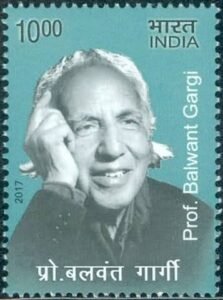
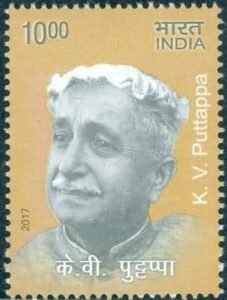
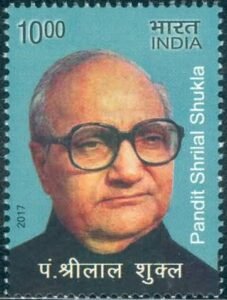
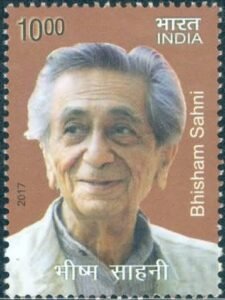
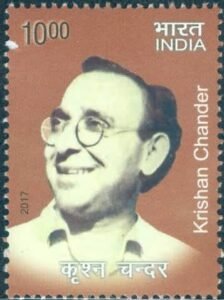
Leave a Comment
You must be logged in to post a comment.